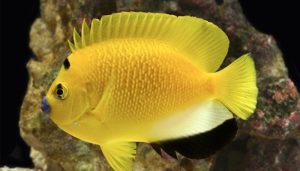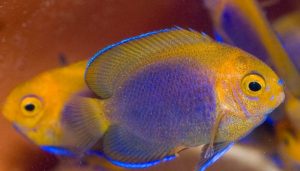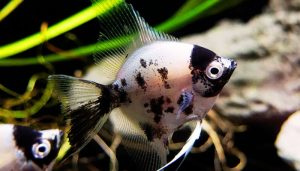Are you a fish enthusiast looking for more knowledge about goldfish? Owning and caring for pet fish can be an enjoyable, rewarding experience. One common question about these animals is: does goldfish eat algae? It’s an essential question for all would-be aquarists out there!
This article will look at the eating habits of goldfish specifically—what they do and don’t like to consume—to create better-informed fish lovers who know how to keep their pets happy.
If you’ve ever seen the bright green substance growing on the glass of your goldfish tank or outdoor pond, you know that algae can quickly become a problem.
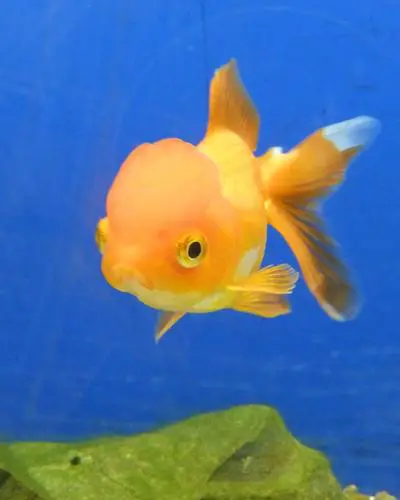
Not only is it unsightly, but it could also weaken water quality and put stress on existing fish populations. But did you know there’s a natural solution to managing this problem?
Some species of fish make expert algae eaters! Fish like goldfish can eliminate unwanted algae and help maintain optimal water quality in their aquatic homes.
In this detailed blog post, we will answer the age-old question: do goldfish eat Algae? We’ll then look at our top five choices for the best pond & aquarium (best algae-eating fish) to help keep your tanks clean and healthy. So if you’re ready, let’s dive in!
Table of Contents
ToggleDoes Goldfish Eat Algae?
Do goldfish eat algae? Yes, goldfish do eat algae in garden ponds. However, it is essential to note that goldfish can never control algae growth completely.
While goldfish may consume the algae in your pond, new plant batches will likely continue growing due to environmental factors such as sunlight or fertilizer runoff from nearby lawns.
In addition, relying solely on goldfish for algae control is not recommended since too much consumption can be detrimental to their health.
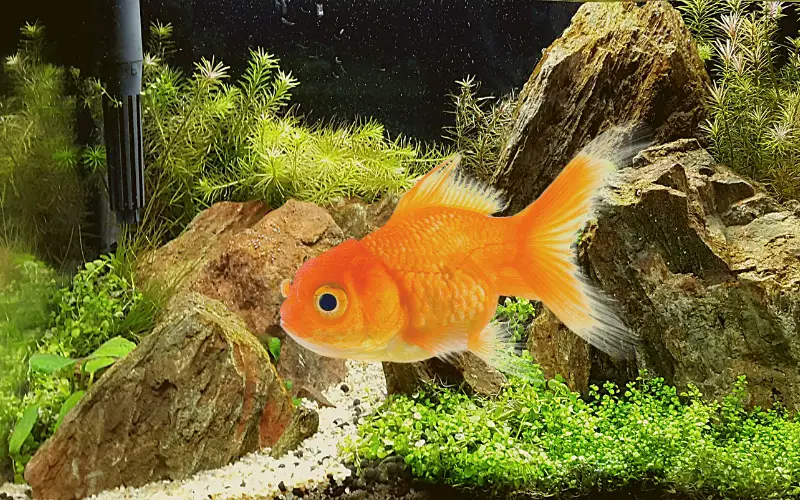
Goldfish need a balanced diet that includes various sources of protein and fiber and plants and fruits like peas and apples.
Therefore, if you want to keep your pond clear from excessive amounts of algae, it’s better to maintain a healthy balance between fish population size, water quality (elevated phosphates), water circulation (aeration & filtration), and regular removal via manual vacuuming or an automated system installed within your pond’s ecosystem.
TOP 5 Best Pond & Tank Algae Eating Fish Species
1. Siamese Algae Eater (Crossocheilus siamensis)
This species is considered the best algae eater for small and large tanks. They are native to Thailand and love eating all types of algae, mainly the dreaded black beard algae (BBA).
2. Bristlenose Plecos (Ancistrus sp.)
These fish are natural pond algae eaters because they can tolerate a wide range of water conditions and will happily snack on most types of algae, including BBA and green spot algae.
3. Otocinclus Catfish (Otocinclus affinis)
These small fish are great for tanks up to 30 gallons. They specialize in cleaning algae from the glass and decorations but won’t touch hair algae or BBA.
4. Chinese Algae Eater (Gyrinocheilus aymonieri)
This species is a hardy option for larger aquariums of 40+ gallons. They will eat almost all types of algae and are also good at clearing up the dead or decaying matter in the tank.
5. Bumblebee Goby (Brachygobius xanthozonus)
Finally, this species is an excellent option for smaller tanks, as algae grow to 1.5 inches. They prefer to eat green algae, but they also snack on other algal matter.
Goldfish are great at helping to keep your pond or tank looking its best by eating away the nasty algae that can accumulate in the water.
However, it is essential to remember that goldfish can never wholly control algae growth and should be accompanied by a healthy balance between fish population, water quality, and adequate filtration and aeration.
Add algae eaters: Use these top five fish species to keep your pond or tank looking its best for more efficient algae removal. And remember to check back for more valuable tips about keeping your tank healthy and free of unwanted algae!
Is Eating Algae Good Or Bad For Goldfish?
Is eating algae good for fish? Algae have no beneficial effect on goldfish. It seems like algae will never damage goldfish. It also doesn’t offer nutritional benefits to goldfish. You need to monitor and control algae growth in aquariums.
Since goldfish like to feed their bodies, the algae will be fed when there is an excess of them. All foods should be eaten in moderation, though overeating can be deadly too.
Similarly, if the goldfish can eat only some of the algae you serve them during the day, they will not like the foods they get. Goldfish must have an optimal diet to grow. OK.
What Does Algae Do for Goldfish?
Algae has no real benefit to goldfish other than the occasional snack. Goldfish mostly stick to their diet of flakes, pellet food, or live food like worms and larvae.
If you have an algae problem in your fish tank, remove the excess with a siphon and manual scrubbing.
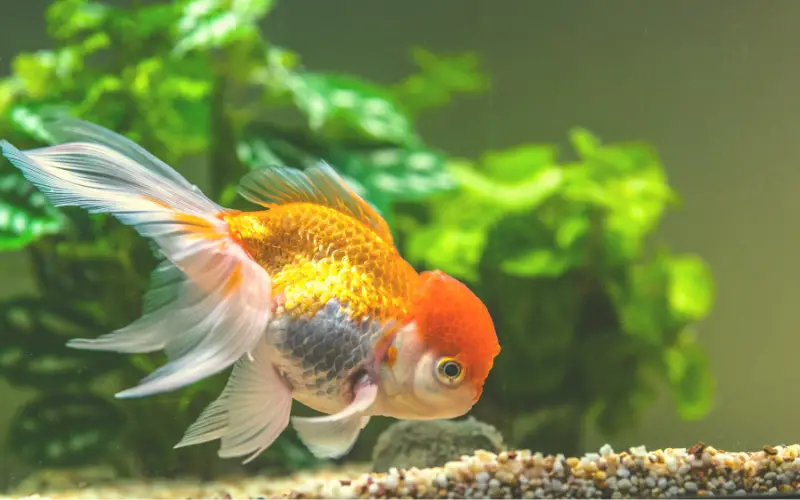
It’s also important to remember that while goldfish can eat some of the algae they find, they won’t be able to control algae completely. Algae will always return due to environmental factors such as sunlight or fertilizer runoff from nearby lawns.
Therefore, it is vital to maintain a healthy balance between fish population size, water quality (elevated phosphates), water circulation (aeration & filtration), and regular removal via manual vacuuming or an automated system installed within your pond’s ecosystem.
Can Too Much Algae Kill Goldfish?
Will Algae Hurt My Goldfish? The algae will vary in nature. Several algae release toxins and substances that can cause goldfish death with time.
Algae also produce more carbon dioxide during the night – lowering their oxidations. And as the oxygen levels in the ocean fall, your goldfish might have difficulty breathing! Too much algae can also disturb the pH level of water and lead to long-term negative impacts.
Can Goldfish Survive on Pond Algae?
Can goldfish and algae live together? Yes, goldfish can survive on pond algae. While it’s not the most nutritious food, consuming some algae is not harmful to your goldfish and can be a supplementary snack to their primary diet.
Pond algae have been known to contain proteins, carbohydrates, minerals, and vitamins, which all contribute positively to the health of your fish!
However, relying solely on goldfish for algae control is not recommended, as too much consumption can be detrimental to their health.
Do Goldfish Eat Algae In Ponds?
Although goldfish primarily eat algae from lakes, their diet won’t cope with the rapid growth of algae. Also, it would help if you did not use them to remove the algae.
The goldfish contributes to algae problems by producing nitrate-rich ammonium that feeds algae and nitrite. It will be best to add several floating plants to the aquarium to remove algae from the water in the water.
Hence algae compete for nutrients, and it begins to disappear. Water lilies and water hyacinths are also good choices. You could use floating trees to kill the algae. You may also remove algae by using API Pond Algage Fix for ponds.
What Kind of Algae Do Goldfish Eat?
Can goldfish eat algae? Goldfish will eat any algae that are present in their environment. Some of the most common algae types, are string algae, filamentous, and diatoms.
String algae are long and thin strands of algae that can be a nuisance in ponds and aquariums, while filamentous is the unicellular green algae commonly found on rocks and walls. Diatoms are single-celled organisms that are usually found drifting in the water column.
Will goldfish eat algae? Goldfish can consume all of these types of algae, but it is important to note that they should not be used as a primary food source. Algae should only be used as an extra treat and not to replace regular meals.
Will Your Goldfish Eat String Algae?
Do goldfish eat string algae? It looks like a bunch of strings will be difficult to eatable, but goldfish will enjoy them. But keep in mind that goldfish cannot remove it.
It will be imperative to take action quickly to remove string algae. It can also be a source of tension, and some fish may be trapped inside.
Do Goldfish Eat Algae Eaters?
It may sound obvious, but adding an algae eater makes it easier and cheaper. You can’t imagine how much goldfish eat. The goldfish indeed ate smaller algal species. Not everyone.
Goldfish is, in fact, an animal that eats anything smaller. Putting a bigger fish into it when you’re small may not be as dangerous as small algae eaters.
For those who like adding algae eaters, plecos are recommended. Rubber-legged plecos make a great choice as they’re secluded fish that can sometimes hide away from their friends and relatives.
What Fish Eat Algae and Can Live with Goldfish?
What Algae Eaters Can Live With Goldfish? Even though fish eat algae, they’ve never eaten anything. Algae increase, especially when light is present. You should therefore find mate goldfishes.
Unfortunately, not all algae-eating fish species are compatible goldfish tank mates. The two algae-feeding fish most compatible with goldfish are rubber-lipped plecos and longfin bristlenose plecos.
Rubber pleco fish are harmless algae-consuming fish that can keep you happy. These peaceful pleco species are good fish for water temperatures of 70 to 80 degrees Celsius, and these temperatures can match ideal temperatures for goldfish.
How to Remove Algae From The Fish Tank?
Algae can be a significant problem for aquarium owners, as it can quickly cover the sides and bottom of the tank, making it difficult for fish to breathe and reducing the overall aesthetic of the tank.
Fish tank conditions affect algae growth. Filling the water tank by adding aquatic plants or reducing feed will help to prevent algae from blooming in the tanks.
Another way to decrease algae blooms is by shading them with light with floating plants. Goldfish care guides suggest keeping water pH between 7.9 and 8.5 and temperature between 64 – 78 degrees Fahrenheit.
A water purifier uses ultraviolet light in ponds by opening the tubes. The aperture is surrounded by ultraviolet radiation; the ultraviolet light is broken into algae by a continuous circulation process that destroys the algae cells.
Algae can take over an aquarium briefly if Left unchecked; not only is this unsightly, but it can also be deadly to your fish.
This video will show you seven tips for removing algae from your aquarium. We will discuss how to remove algae from glass tanks, acrylic tanks, and planted tanks. We will also talk about how to reduce algae growth in your aquarium.
Fish That Eat Algae in Tanks
The best pond fish that eat algae in tanks are Scarlet Badis (Dario Dario), Siamese Algae Eaters (Crossocheilus siamensis), Otocinclus Catfish (Otocinclus affinis), pond loach, Blue Eye Pletasmius Cetosoma, Bristlenose Pleco (Ancistrus temminckii) and Nerite Snails (Neritina sp.).
All these fish will help keep your tank clean by eating various types of algae, including green slime coating, brown diatoms, black beard, and string.
However, they should be relied upon to help keep your tank clean as they cannot handle large amounts of algae or consume all types. It is also essential to prevent algae growth by reducing light levels and avoiding overfeeding.
Does Overfeeding Goldfish Cause Algae Growth?
Yes, overfeeding your goldfish can cause algae growth. Feeding your goldfish too much food will excrete too much waste, which contains organic compounds like ammonia, nitrite, and nitrate that act as a fertilizer for the algae in your aquarium.
This excessive nutrient input causes an increase in algal productivity that may lead to green water or even fouling of tank surfaces by excess algae growth.
Like other organisms, algae thrives from goldfish excrement. The goldfish will be releasing a lot of garbage. In addition, overfeeding leaves many food leftovers in the tank.
Consequently, the goldfish excreted by your goldfish or the food left in decaying food serves as food to the algae. Over-feeding your fish causes algae to form in aquariums.
Commonly Asked Questions About goldfish eating algae (FAQ)
Do Goldfish Eat Algae Wafers?
Goldfish will eat algae-based commercial foods as a supplemental food source. Algae wafers contain carotenoids, essential vitamins, and nutrients for the goldfish’s health. Algae wafers also contain high levels of fiber, which helps the goldfish digest their food.
Do Goldfish Eat Tadpoles?
Yes, goldfish will eat tadpoles if given the opportunity. Tadpoles are an excellent source of protein for goldfish and provide some essential vitamins and minerals. However, if you have the choice, it is best to feed them algae wafers or other high-quality foods.
Do Goldfish Eat Brown Algae?
Yes, goldfish will eat brown algae. Brown algae are a type of filamentous algae and can be found in aquariums and ponds. Goldfish will eat the algae when available and help keep your aquarium free from brown algae.
Do Goldfish Eat Bacteria?
No, goldfish do not eat bacteria. Bacteria form a large part of the goldfish’s diet, but they do not actively hunt it out as a food source. Fish feed on detritus and other organic matter, allowing them to consume the beneficial bacteria in their environment indirectly.
Do Comet Goldfish Eat Algae?
Yes, comet goldfish do eat algae. Goldfish are omnivores and consume various foods, including plants, insects, crustaceans, and algae. Algae provide a valuable source of nutrition for goldfish, especially when other food sources are scarce.
Do Koi Eat Algae?
Yes, koi do eat algae. Koi are omnivores and consume various foods, including plants, insects, crustaceans, and algae. Algae provide a valuable source of nutrition for koi, especially when other fish food sources are scarce. However, it is essential to note that koi should not be solely relied upon to clean algae from your fish tank.
What do goldfish eat in a pond?
Goldfish are omnivores, munching on pond plants like algae and duckweed, plus aquatic insects, worms, and even mosquito larvae!
Conclusion
So, does goldfish eat algae? In conclusion, goldfish eat small amounts of algae and can survive without it. While they won’t stop the spread of algae, they can limit its growth. If you have an issue with excessive algae in your pond or fish tank, choosing one of the 5 best pond algae eaters we listed is an effective way to address the issue over time.
With these fantastic creatures to help you on your journey, you’ll have a beautiful and algae-free ecosystem in no time! Just be sure to research all your options thoroughly when selecting any species for your aquatic environment; this will ensure each fish, plant, and organism gets proper care and will live a long and happy life. Thanks for reading, and happy fishkeeping!
You might also like
- What Algae Eaters Can Live with Goldfish? (5 Best Tankmates)
- Can Goldfish See in the Dark to Eat? (You might Be Shocked)
- How Many Times Do You Feed a Goldfish a Day? (Solved)
- Do Goldfish Need a Heater? Yes, or No (Let’s Quell The Myth)
- What to Feed a Goldfish? 7 Helpful Goldfish Feeding (Tips)
- How Long Do Goldfish Live in a 20-Gallon Tank: Unlock Secret
- How Long Do Comet Goldfish Live: 7 Proven Tips for a Longer Life
- How Long Can a Goldfish Live in Its Bag: 5 Transportation Tips
- Can You Keep Catfish with Goldfish: 7 Vital Tips for Success
- Fish That Eat Algae in Ponds: 10 Natural Pond Algae Eaters Revealed!
- Asian Algae Eater 101: Ultimate Care Guide for Beginners!


